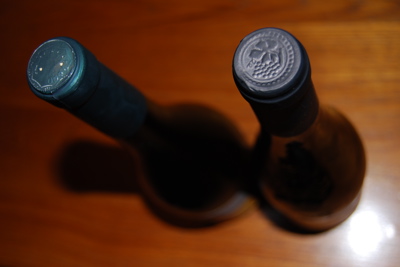Corked Wine:
What is it and how can you spot it?

Corked wine is one of the most common flaws in bottled wine. Yet, most people don't know what it is or how to spot it. In fact, when most people first hear the term they assume it refers simply to a wine bottle which is closed with a cork or that the cork itself did something to harm the wine. Here we will clear up these misconceptions and give you a clear understanding of what it means for a wine to be "corked" or "corky" or to have "corkiness".
What is a Corked Wine?
A wine which is corked is a wine which has a specific flaw that is caused by contamination by a chemical compound called 2,4,6-Trichloroanisole (TCA for short), also know as cork taint. What is this compound and how did it get in your wine? It is generally thought that TCA is created by some types of airborne fungi which can infest some corks. If a wine bottle is closed with a contaminated cork, the TCA slowly leaches into the wine, leading to a flawed wine. We refer to wines which are affected by TCA as corked wine. Alternatively, the wine can be described as "corky" or to show some "corkiness".
Cork taint by TCA is one of the most common flaws in the world of wine. While estimates vary considerably, as many as one in ten bottles with cork closures can be contaminated. Estimates vary from as low as 2% up to 10% or more. This horrible scourge which destroys bottles obviously causes a lot of heartache for wine consumers and people in the wine business alike. In the last several years there has been a movement toward non-cork closures for wine bottles to avoid this flaw. The amount of synthetic corks and screwcap closed bottles has increased considerably, even for higher end wines.
What Does TCA Do to a Wine and How Can I Detect It?
Although harmless to humans, TCA creates an aroma which is distinct and unpleasant. The aroma masks the normal wine aromas and flavors and destroys the wine in bottle. Some people are more sensitive to TCA than others but most describe the aroma of a corked wine as being musty or moldy, like wet newspaper or cardboard, a wet dog or a damp, moldy basement. In other words, it smells like musty mold, as could be expected from its fungi origins. Depending on how much TCA is in the wine, this aroma and flavor can vary from slight to completely overwhelming. It masks and obliterates the normal aromas of the wine and even the flavors can be affected, seeming blunted and muted.
TCA can affect any wine with a cork closure. It is not only a problem with cheap wines, it can affect even very high-end wines.
What Can You Do If You Encounter a Corked Wine?
Generally, corky wine is considered not drinkable, although it will not hurt you to do so. If in a restaurant, tell your server the wine is corked and ask for a replacement. Most good restaurants will happily replace the bottle for you. If you bought the bottle at a wine shop, most wine shops have a policy of replacing corked bottles if you leave the wine in the bottle and re-cork it. They can send it back to the distributor and get a credit for it. Some people say that you can use corked wine for cooking or making vinegar, but for me, I don't put any wine in my food or in my vinegar that I wouldn't put in my mouth in the first place!
Some people suggest a trick to "rescue" corked wine. They put wadded up Saran Wrap™ into the bottle for a prolonged period of time. The theory is that some plastics like that included in the wrap will absorb the TCA more readily than the wine itself, effectively filtering the contaminant from the wine. While this sounds good in theory, results are quite mixed, with some people saying it works perfectly and others saying it does nothing. In our experience trying this trick many times, it works moderately. Yes, it removes much if not all of the corky aroma. However, the wine that is left also seems to have suffered, with a muted aroma and flat, lifeless flavors. I prefer to return the bottle and get a replacement if possible or simply move on to another wine.
Done learning about Corked Wine?
Return to the How to Taste Wine page.
